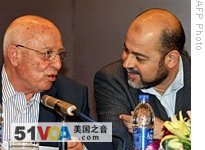Cairo
26 February 2009
 |
| Fatah's Ahmed Qurei (l) and Hamas' Mussa Abu Marzug speak during their meeting in Cairo, 26 Feb 2009 |
Rival Palestinian factions Fatah and Hamas have agreed to set up committees to plan for elections and work toward a new national unity government. The agreement was reached late Thursday during talks in Cairo.
Delegations from the two Palestinian factions met at the Cairo office of Egypt's intelligence chief, Omar Suleiman.
Following the talks, the rival factions said they had come to an agreement, after months of bitter feuding, to set up five committees which will hammer out details of a new national unity government, presidential and parliamentary elections and a new, non-partisan security force for the Gaza Strip and the West Bank.
Former Palestinian Prime Minister and top Fatah representative to the conference Ahmed Qurei told reporters that the committees would tackle the tough issues facing rival Palestinian groups.
He said that a government committee will be formed with the aim of creating a national unity government, then a security committee would meet to rebuild the security forces on a non-partisan basis. He added that an elections committee would plan for presidential and parliamentary elections within the legal deadline.
Moussa Abu Marzouk, the Damascus-based deputy head of Hamas' political bureau, told reporters that the most important issue in forming a unity government would be tackled quickly.
He said that when it comes to applying the agreement, some committees, like the government committee would quickly put together a government capable of uniting Gaza and the West Bank. The government committee, he added, will decide the exact form and composition of the new government.
The main goal of reconciliation talks between Fatah and Hamas is to agree on a national unity government acceptable to the international community. Most international donors are unwilling to help rebuild the war-torn Gaza Strip as long as Hamas controls the territory.
Hamas delegation leader Abu Marzouk says his organization would not interfere with the plans of international donors, and that Hamas would not let political disputes interfere in the rebuilding of Gaza.
He says that the program to rebuild Gaza will be discussed at the Sharm el-Sheikh conference in Egypt scheduled for Sunday, and that Hamas believes rebuilding should be kept separate from political issues.
Billions of dollars in reconstruction money are expected to be pledged by international donors at the meeting.
Twelve Palestinian factions, including Fatah and Hamas, attended the reconciliation talks. Fatah and Hamas have been at odds since Hamas seized power in Gaza in June 2007.